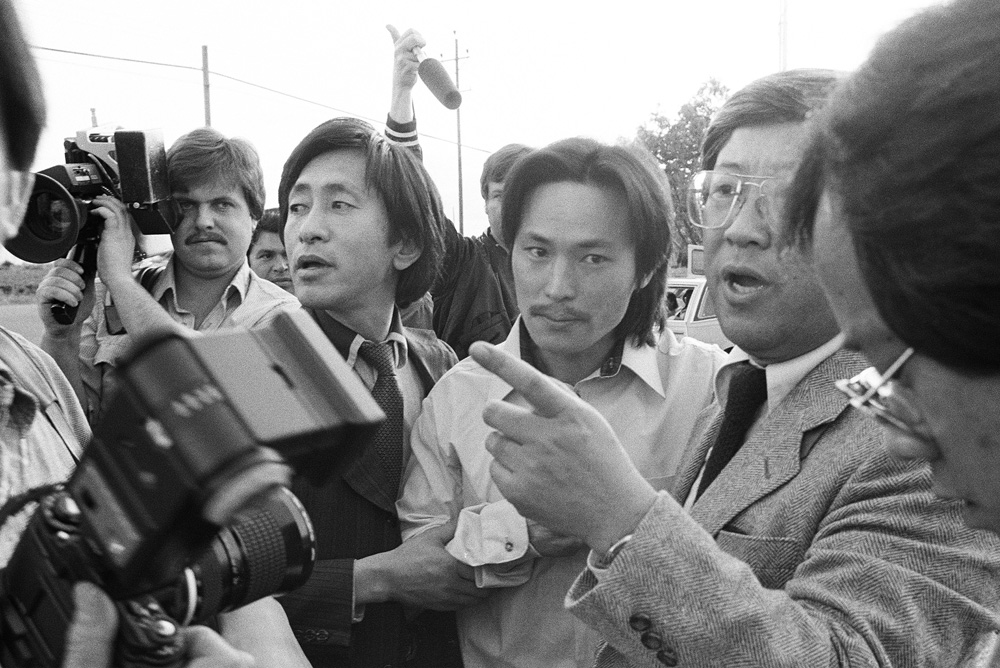It’s notable that the first words you hear in “Free Chol Soo Lee” are those of its subject when as he’ll later say to a reporter who takes an interest in his case after he’s spent four years in prison for a murder he didn’t commit, he’s never had a chance to tell anyone he’s innocent. Lee is seen saying “sorry for all the smoke” to a board of some type during his travails in the legal system, but he has little else to apologize for, nor will he receive the apology he actually deserves after being incarcerated on specious evidence – police claiming they traced a bullet from a gun he was in possession of for a brief time to a random person on the street and witnesses that likely based their conclusions on his Korean ethnicity than more specific details. However, it isn’t just the prosecutors’ case that is meticulously and convincingly picked apart in Julia Ha and Eugene Yi’s engrossing documentary, but the entire American justice system as a whole, particularly as it relates to minorities.
Ha and Yi impressively streamline a most complicated story, one that Ranko Yamada, an early advocate of Lee’s had to make a slide show to explain the details of the case to people to gain their support for his release, but as the film becomes more dense with information, a clear through line emerges as no American institution had any patience or compassion for Lee, from the school system that he entered at the age of 12 without speaking a lick of English after first arriving in San Francisco, leading to a stint in juvenile hall and subsequently a psych ward when they couldn’t communicate with him, to the cops that saw Asians generally as an easy mark to boost stats at a time when they were under pressure from their boss to the judicial system where crucial information on the case was hidden from the defense. It isn’t just these compounded experiences that take a toll on Lee when he knows the truth, but as the filmmakers are smart to extrapolate, how it actually looks on his record when the minor infractions on Lee’s rap sheet gave the credibility needed to pursue him for larger crimes and eventually his time in prison leads to a fight where self-defense ends in a second murder charge against him.
The domino effect on Lee is staggering, but it’s not the only one “Free Chol Soo Lee” effectively chronicles, finding a more heartening story in the movement his incarceration inspired as Korean churches lined up to support him and Asian American activists would raise money with the sales of hot links, dance parties and even a song, “The Ballad of Chol Soo Lee” that could be played on the radio. The collective power of the community isn’t underestimated as public protest, but Ha and Yi are more interested in the initially nourishing effect it had privately on Lee, who could be buoyed by the knowledge that he hadn’t been forgotten on the outside, using his time on death row to write back to those who sent him letters of support, though a fascinating part of the film becomes how it was a double-edged sword once he was exonerated, left to wonder whether he could possibly live up to the iconic status that had been built up while he was inside. Having to reckon with such disillusionment is something Lee never should’ve had to wrestle with in the first place, and “Free Chol Soo Lee” presents a man who never knew of a life where he wasn’t on defense and whose behavior, for better or worse, can be seen as a product of the abuses of the system he suffered rather than his own free will. Released from prison, but never able to actually escape in his mind, Lee gets a film in his name that is naturally unforgettable as well, but Ha and Yi allow the room to completely rethink what we know about how the legal system works and for whom.
“Free Chol Soo Lee” will screen virtually at the Sundance Film Festival on January 23rd for a 24-hour window beginning at 8 am MT.




